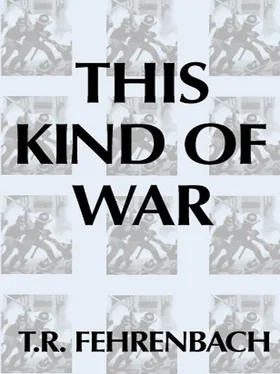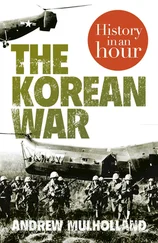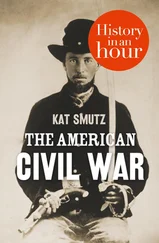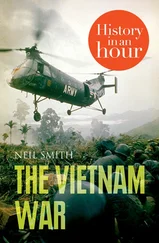They began, knowingly and cunningly, to contain the spread of Communism through whatever policy, short of war, might be required. This containment was vital to American interests, but it must always be remembered that the mere mention of such a policy would have sent millions of patriotic, well-meaning American liberals into convulsions. Liberal thought, which had scented Hitler early, seemingly remained tragically blind to Communist tyranny.
Before any attack on the morality of the men who formulated the policy of Communist containment may be made, several things should be recalled: these men had no designs on the world. They had no nationalist or imperialist policies to foist on anyone; they wanted to keep order and, so far as possible, the status quo, in an era when the Soviet Government clearly desired the opposite. The Soviets were doing their utmost to create chaos, so that they might then impose their own tyrannical system over an ever-widening circle.
If the popular will of the earth desired the Communists to be given a free hand, if it did not have either the physical or moral hardness to offer opposition—then the popular will, for its own sake, needed circumvention.
Thus in the Truman Administration there existed a basic dichotomy, between the politicians and liberals, the Hannegans, McGraths, McGrannerys, on the one hand, and the soldiers and bankers on the other. Each operated almost in a vacuum where the other was concerned.
The one rare exception to the pattern, Louis Johnson, was the most tragic figure of all. Johnson was a businessman liberal, a "go-getter," the sort of man who would later look for a "bigger bang for a buck." When Louis Johnson began to cut the armed forces, it must be remembered he was giving the bulk of the American public, liberal and business-conservative alike, precisely what it wanted.
Truman's own tragedy remained that the people on whom he depended for domestic support would simply not support his foreign policy. For the policy that evolved in the 1940's was new to American thought. It was not underprivileged Democratic, nor was it business Republican. It was orderly, worldseeing, pragmatic, and conservative—but conservative in the British or ancient Roman sense, not in the American sense.
Denied popular support, Truman functioned without it. Possibly history will accord him that as his greatest feat. History must also condemn him, with his Cabinet, for his inability to communicate. Wherever there is rule by consent of the ruled, the rulers must always be salesmen, however difficult the task.
For the first time in history, or at least for the first time since before the War Between the States, America had embarked upon a foreign policy that was not at least partially a crusade. The policy was the restoration of order in the world, and the orderly containment of Communism—not its hysteric extirpation, as with Hitler and "Kaiser Bill," by means of cataclysmic war that could, at best, solve nothing.
Since Wilson's time, some Americans had learned much.
In Europe, beginning with 1947, the policy succeeded brilliantly. It succeeded without the sine qua non of international politics, armed force, for both sides understood the stakes in Europe were too vital to risk less than all out effort, if force were used.
The policy in Asia succeeded less well, because American planners were slow to see the importance of the East, and did not early recognize the Soviet shift to that area in 1949. Because of a certain indecisiveness on Asian policy, apparent to the Soviets, there would be war.
But even then it would be war different from all wars in American experience, except the Indian campaigns on the Plains. It would not be a crusade, because neither Harry Truman nor the men who handled his foreign policy were crusaders across the water. Because it was different, it would have far-reaching results. It would be the first war to bring down a government, to oust a party in power, not because of the actions that party had taken, but because the policy makers were never able adequately to explain those actions to a troubled and increasingly hostile public.
Like the Indian Wars, it would leave a troubled feeling, a trauma, in its wake. Crusades, even when failures, are emotionally satisfying. Wars of containment, wars of policy, are not. They are hard to justify unless it is admitted that power, not idealism, is the dominant factor in the world, and that idealism must be backed by power.
It was hard for a nation and a people who had never accepted the idea of power, not as something immoral in itself, but as a tool to whatever ends they sought, to fight and die for limited goals. In short, it was hard to grow up.
The Korean problem came again in Swink in 1947. Now the men of the State-War-Navy Coordinating Committee understood three things:
The Russians had different ideas as to what should be the solution to the Korean problem, and they would not cooperate, not now, not ever.
Without massive American support and economic aid, Korea would never achieve a viable economy.
And in event of large-scale war, Korea was a liability; the men based there would be lost to the services.
Swink wanted a way out of Korea, if there was a graceful one to be found. They requested the views of the Joint Chiefs of Staff. A complete decision was not, of course, the responsibility of the Joint Chiefs, who should have had no influence on what was, essentially, a political rather than a military matter. But in 1947, the civilian branches of government were letting Asian policy fall to the military by default—someone, qualified or not, had to make decisions, however painful such decisions might be to make.
Later, this power of decision would be taken away from the military, just as it should never have been given them. But it must be remembered that all through the 1940's civilian policy makers tended to shun Asian questions, letting the military have a disproportinate voice. Only when it came to cutting back military strength and expenditures did civilian planners advance with firm and happy tread.
At the end of World War II, American military policy, digesting the Japanese lessons in China, was to control air and sea lanes throughout the East but never to engage in ground hostilities on the Asian mainland. As one spokesman put it, "There was no point to mucking about through Manchuria."
The only war that military planners could envision was a big one between the United States and the Soviet Union. They assumed that in the future, as historically, America would never fight for limited goals; in the event of actual war, an all-out effort would be made to break or destroy the Soviet homeland. This was neither faulty thinking nor planning. The military men were following what had been American experience in the twentieth century. Many of the military planners themselves were not aware of the change to conservative, pragmatic thinking in certain quarters of Washington—thinking that was never explained to the public or to the military. The military continued to plan for the only kind of war they had been told to plan for: worldwide, atomic holocaust.
On 26 September 1947 the JCS sent Secretary of Defense Forrestal their reply:
From the standpoint of military security, the United States has little strategic interest in maintaining the present troops and bases in Korea.
Thinking of the then-American atomic monopoly, the JCS wrote:
…Enemy interference from Korea could be neutralized by air action, which would be more feasible and less costly than large-scale ground operations.
But the JCS made one other point very clear:
A precipitate withdrawal of our forces … would lower the military prestige of the United States, quite possibly to the extent of adversely affecting cooperation in other areas more vital to the security of the United States.
Читать дальше












